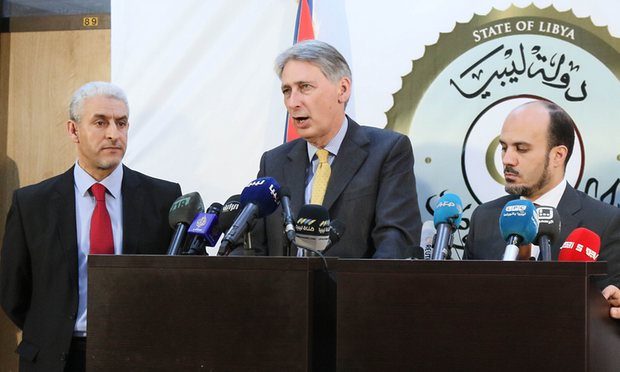UK could consider Libyan GNA’s request for naval or air support, revealed Philip Hammond
Foreign secretary says British government should not rule out providing assistance, but parliament approval would be sought

The UK is willing to consider a request from the Libyan government to provide air or naval support in an effort to drive out Islamic State from its coastal stronghold in Sirte, Philip Hammond has said.
“Now is the time to move against them [Isis],” the foreign secretary told MPs on Tuesday. He said he did not expect a request from the Libyan prime minister, Fayez al-Sarraj, in the short term.
“I can envisage prime minister Sarraj, if his government is successful, being able to muster enough ground forces to mount an attack on the Daesh [Isis] stronghold around the coastal port of Sirte. It is certainly the case [that] the Libyans will not be able to develop either naval or air assets in any reasonable period to support such an operation, and it is quite possible they would seek military support from outside.”
Hammond said it would be wrong for the UK government to rule out responding to any such request, although he added that the support of parliament would have to be sought first.
The foreign secretary estimated that there were 3,000 Isis fighters in Libya and said they were currently running a holding operation, possibly using the territory “as a bolthole if they find their freedom of manoeuvre is coming under intolerable pressure in Syria”.
“There are many pointers that now is the time to move against them in Libyawhile they are relatively thin on the ground and their operation is in a holding phase,” he said.
“The principal route of access to Libya for Islamic State was by sea and the Libyans are struggling to control that access with their resources.”
It is the most explicit indication yet of Hammond’s willingness to send UK forces to remove Isis from Libya.
Hammond, who visited the Libyan capital, Tripoli, on Monday to meet leaders of the UN-brokered government of national accord, repeatedly stressed the need to balance the requirements of the west in Libya with the political goals of the government.
Western countries are hoping that the GNA will unite Libyans and help the country combat the Isis affiliate there.
Hammond said that in the short term, the most likely request would be for an international force to help train the Libyan army and police. The UK contribution to such a mission was likely to involve between tens and hundreds of trainers, including some provided by contractors, as opposed to current service personnel, he said.
Any EU military training plan is likely to be part of a comprehensive package, including financial aid such as that provided by the bloc to Turkey, Hammond added.
The foreign secretary said the EU had to move cautiously due to sensitivities around Libya’s sovereignty and the need to include any training as part of a wider solution that addresses Libyan concerns.
“We do not anticipate any request from the government of national unity for ground combat forces to take on Daesh or any other armed groups and we have no plans to operate in such a role,” he said.
Short-term goals may include lifting sanctions, possibly ending an arms embargo and trying to bring the various militias under some form of central control.
Hammond was criticised when he said the government would only seek the consent of MPs for the use of UK troops deployed in a combat role in Libya, but not for the deployment of UK troops in a training role. The chair of the foreign affairs select committee, Crispin Blunt, said Hammond was treading on very thin ice by suggesting that there was a clear distinction between sending troops to Libya to train the Libyan army as opposed to playing a combat or combat support role.
The foreign secretary said he did not think the lines between the two missions need become blurred, pointing out that UK forces are currently training and advising troops in Afghanistan and Iraq.
He added that his preference was for Libyan military forces to be trained outside Libya, possibly in Tunisia, and admitted that previous efforts to train Libyan army fighters in Cambridgeshire ended disastrously amid allegations of sexual assault.
Hammond said there was currently a wariness about foreign forces operating in Libyan territorial waters, even if the objective was to counter migration as opposed to Isis.
He said there are about 120 competing groups in Libya, although the different factions are by and large not motivated by extreme religious ideology, but traditional concerns for money and power. The long-term political solution lay in devolution of power, rather than seeking another strongman, Hammond added.
Libya has been mired in political and security chaos since the western-backed overthrow of Muammar Gaddafi in 2011.
[su_note note_color=”#fefccb”]The views expressed in this article are the author’s own and do not necessarily reflect Libyan News’s editorial policy.[/su_note]
How to submit an Op-Ed: Libyan Express accepts opinion articles on a wide range of topics. Submissions may be sent to oped@libyanexpress.com. Please include ‘Op-Ed’ in the subject line.
- HoR-Backed Government moves to end fuel subsidy - December 26, 2024
- Libya and Algeria bolster customs cooperation - December 24, 2024
- Reports claim S-400, S-300 missiles moved to Libya - December 24, 2024


